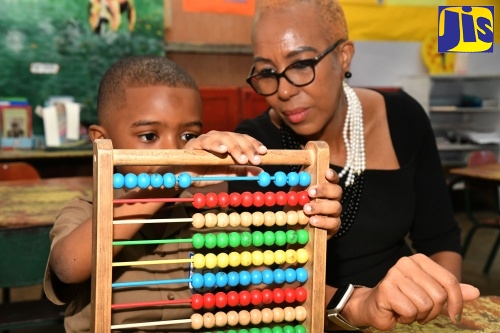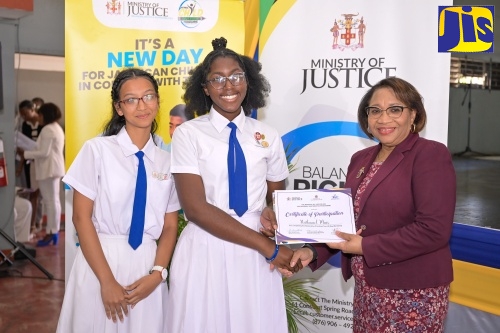Gov’t Taking Steps to Reduce Violence in Schools
By: , May 27, 2024The Full Story
The Government is moving to strengthen measures to reduce incidents of violence in schools.
Prime Minister, the Most Hon. Andrew Holness, says it is important that every step is taken to reduce instances of violence, so that children can learn in a safe environment. To this end, the Ministry of Education and Youth, as well as the Ministry of National Security, are to undertake a reassessment of the security risk of schools.
“That way, we can get a better understanding of which schools are at risk and how to direct resources to those schools. We have already started to increase the number of case managers that would be available for community interventions and school interventions through the Ministry of National Security, and we are going to increase the number of school resource officers,” the Prime Minister says.
He notes that the school resource officer programme has been effective but “…depending on the intensity of implementation, sometimes schools get resource officers and sometimes they do not”.
“What we are going to seek to do now, after the conduct of this new assessment of the schools, is to increase the numbers and then redirect some of these officers to those schools with the highest risk,” Mr. Holness says.
In addition, all schools have been directed to review their entry and search policies and must now seek to put in place measures to detect and seize weapons in schools, particularly knives and other implements that can be used to cause damage.
The Prime Minister also mentioned that the Government is looking to implement social-intervention initiatives to help counter issues such as bullying and the recruitment of children to gangs.
Minister of Education and Youth, Hon. Fayval Williams, says the Ministry has employed a multipronged approach to prevent violence, starting with the Safety and Security Policy.
“It clearly spells out how to implement physical security measures such as searches of students’ school bags; organising training programmes for school personnel to recognise warning signs and intervene effectively; counselling at-risk individuals; developing crisis and emergency plans; assigning roles for students, parents, and the community; and addressing and resolving conflicts in a constructive manner,” she notes.

She further mentions the School-Wide Positive Behaviour Interventions and Support (SWPBIS), which is a Caribbean-wide programme that is in 509 primary and secondary schools in Jamaica.
“It is a framework designed to enhance students’ understanding of behaviour expectations at school. It builds and/or changes the social culture within the schools in which it is practised. This is a universal, school-wide prevention strategy aimed at reducing behaviour problems that lead to discipline referrals and suspensions and change perceptions of school safety,” Mrs. Williams points out.
The Minister further cites the Health and Family Life Education (HFLE) programme, which is a life skills-focused education process to help students achieve their potential and assure their healthy contribution to the social, cultural, and economic development of Jamaica.
“This is time-tabled in our schools and is taught from primary through to secondary. It focuses on problem-solving conflict resolution, how to deal with stress, how to say no and how to walk away. HFLE also provides guidance and counselling to individuals, groups and families,” she says.
Another initiative is the Restorative Practice Training Programme.
In February, the Ministry signed a Memorandum of Understanding (MOU) for the continued delivery of Restorative Practice training in schools across Jamaica.
Through this agreement, 500 schools will be targeted and some 12,500 participants, including school administrators, educators, students, parents, and guardians will be trained.

Under the MOU of May 2022, training took place in 258 schools, impacting more than 7,900 students, 1,109 educators and 1,034 family members.
Mrs. Williams noted that restorative justice is an important tool in reducing violence by enabling individuals to have access to a dispute-resolution process at the early stage of conflict to avoid escalations to violent reactions.
The Ministry has also started the process of replacing 30 per cent of security cameras within schools.
Based on a recent survey, 154 schools have installed a total of 1,955 cameras.
“Cameras are deployed in schools to help us detect and deter. We have started to replace approximately 30 per cent of them, so we have better technology,” Mrs. Williams reports.
“We have embarked on a significant procurement of cameras to outfit all our schools with CCTV (closed-circuit television) cameras. We should be able to put out the tender by the first term of the next school year,” she informs.
In addition, there are currently 1,098 guidance counsellors in the schools, as well as a total of 140 deans of discipline in the high schools.
Also, in December 2023, the Ministry introduced its Behaviour Change Student Support Team Approach initiative, where the Government allocated an additional $72 million for the programme.
“This is where the deans of discipline get together with the classroom teachers, guidance counsellor, school nurse, the HFLE, principal or the vice-principal and they form one unit to provide collaborative support services for the students,” the Education Minister says.
For the period January 2022 to January 2023, a total of 55 critical-incident reports regarding violence in schools were submitted to the Ministry.
The 55 critical incidents occurred at 50 different schools, 15 primary and 35 high schools, while five of the schools had two critical incidents each.

